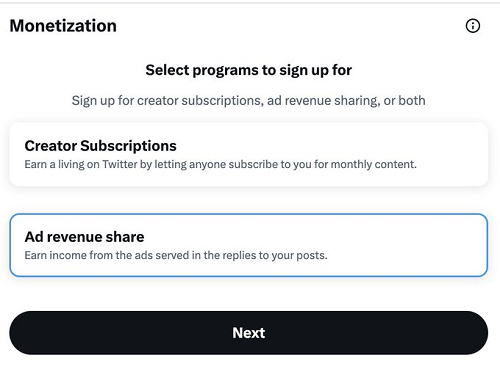Another key element of Elon Musk’s Twitter 2.0 vision is getting close to launch, with its ad revenue share program for tweet replies seemingly now set for live deployment.

As you can see in this example screen, pulled from the back-end code of the app by researcher Yaroslav (and shared by T(w)itter Daily News), creators will soon be able to sign up for Twitter’s new ad revenue share program, which will see revenue generated from ads displayed in their tweet replies shared with them, providing another monetization opportunity in the app.
Twitter CTO Elon Musk announced the coming program earlier this month, with Twitter Blue subscribers able to sign-up for a share of any revenue generated from ads shown in their tweet responses.
Which is helpful, in that it will give people more ways to make money from their Twitter presence, though as we noted at the time, it could also incentivize more incendiary, divisive tweets, in order to spark more responses, and thus, more opportunity for ads to be displayed in reply chains.
Research has shown that high arousal emotions, like anger and happiness, are the key drivers of comments on web posts, with negative emotions driving more virality – meaning that the best way to maximize the amount of comments and replies is to post things that make people angry enough to respond.
Twitter’s program is also restricted in terms of who can sign up (Blue subscribers only), and where ads are shown, with only ads served in the replies of verified users counting towards this new revenue pool that will then be shared with creators.
And with only around 0.3% of Twitter users paying for Twitter Blue, that’s a relatively limited field of those eligible for the program. But still, it’s better than nothing, and in combination with subscriptions, it does provide another potential pathway for people to make money just from their tweets.
Twitter’s hoping to win over more creators with better revenue share and posting options, in order to maximize its opportunities, and get more content flowing through the app. Elon Musk has repeatedly stated his intention to compete with YouTube with Twitter’s own video posting options, while Twitter’s also now added long-form posts (up to 25k characters) and new text formatting options, to provide more ways for creators to maximize their in-app presence.
It remains to be seen whether Twitter will be able to offer comparable revenue opportunities, with YouTube and Meta still providing more viable, valuable pathways on this front, while it’s also unclear how Twitter users will respond to longer-form content in the app.
But Elon’s keen to build in more functionality, as a means to maximize Twitter’s utility, and transform it into an ‘everything app’ that will serve a broader purpose for users, and provide more value than the Twitter of times past.
It’s an ambitious aim, but that, I guess, is what Elon specializes in. And while much of Twitter’s next-level growth strategy remains vague, it is adding more functionality and options, at a rapid rate.
This element, within itself, is not going to make anyone rich, while as noted, it could also lead to negative engagement. But it’s another step in the Twitter 2.0 process, as Musk works to rebuild the value of the app.



